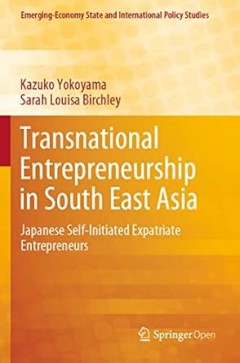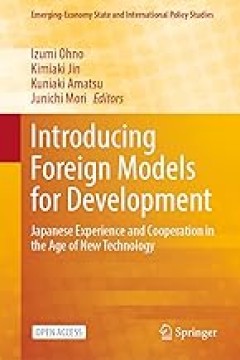Filter by

Im Spannungsverhältnis zwischen Selbst- und Fremdverstehen
Dieser Open-Access-Sammelband hinterfragt, wie sich internationale Kulturzusammenarbeit zwischen Ländern unterschiedlicher Kultursysteme und -traditionen erreichen lässt. In Deutschland ist Auswärtige Kulturpolitik von dem Gedanken geleitet, dass globale Herausforderungen Multilateralismus erfordern. Im chinesischen Diskurs dagegen finden andere Kernbegriffe wie z.B. „Tianxia“ Verwendung…
- Edition
- 1
- ISBN/ISSN
- 978-3-658-40031-6
- Collation
- XIX, 388
- Series Title
- -
- Call Number
- -

Transnational Entrepreneurship in South East Asia
Professor Yokoyama is the Dean of the Graduate School of Business Administration, Toyo Gakuen University, Tokyo, Japan, where she supervises research in the field of human resource management in Japanese companies by drawing comparisons between Japanese-style employment management and the merit-based systems. Her recent research is concerned with Japanese self-initiated expatriate entrepreneurs…
- Edition
- 1
- ISBN/ISSN
- 9789813292529
- Collation
- XXI, 220, hlm,: ill, lamp;
- Series Title
- -
- Call Number
- -

Discourses of global queer mobility and the mediatization of equality
- Edition
- -
- ISBN/ISSN
- 9781003087960
- Collation
- -
- Series Title
- -
- Call Number
- -
- Edition
- -
- ISBN/ISSN
- 9781003087960
- Collation
- -
- Series Title
- -
- Call Number
- -

Media, place and tourism: a world of imagination
Introduction: Worlds of imagination / Stijn Reijnders, Emiel Martens, Apoorva Nanjangud, Deborah Castro, Rosa Schiavone and Débora Póvoa -- The runaway production of A daughter of the gods : film, tourism and empire in early twentieth-century Jamaica / Emiel
- Edition
- -
- ISBN/ISSN
- 9781003320586
- Collation
- -
- Series Title
- -
- Call Number
- -

Technology Assessment in a Globalized World
This open access book explores the relevance of the concept of technology assessment (TA) on an international and global level. Technologies play a key role in addressing global challenges such as climate change, population aging, digitization, and health. At the same time, their use increases the need for coordinated action and governance at the global level in the field of science, technology…
- Edition
- 1
- ISBN/ISSN
- -
- Collation
- -
- Series Title
- -
- Call Number
- XIII, 271

Self as Method
Despite China’s rise to the status of global power, many Chinese youths are anxious about their personal future, in large measure because the rapid changes have left them feeling adrift. This book, available in open access, provides a manifesto of intellectual activism that counsels China’s young people to think by themselves and for themselves. Consisting of three conversations between Xi…
- Edition
- 1
- ISBN/ISSN
- 978-981-19-4953-1
- Collation
- -
- Series Title
- 1 b/w illustrations
- Call Number
- VII, 268
International Labour Organization and Global Social Governance
This open access book explores the role of the ILO (International Labour Organization) in building global social governance from multiple and mutually complementary perspectives. It explores the impact of this UN´s oldest agency, founded in 1919, on the transforming world of work in a global setting, providing insights into the unique history and functions of the ILO as an organization and the…
- Edition
- -
- ISBN/ISSN
- -
- Collation
- -
- Series Title
- -
- Call Number
- -

Planetary Hinterlands
This open access book considers the concept of the hinterland as a crucial tool for understanding the global and planetary present as a time defined by the lasting legacies of colonialism, increasing labor precarity under late capitalist regimes, and looming climate disasters. Traditionally seen to serve a (colonial) port or market town, the hinterland here becomes a lens to attend to the times…
- Edition
- -
- ISBN/ISSN
- 978-3-031-24243-4
- Collation
- XVI, 341
- Series Title
- -
- Call Number
- -

Introducing Foreign Models for Development
This open access book studies how foreign models of economic development can be effectively learned by and applied to today’s latecomer countries. Policy capacity and societal learning are increasingly stressed as pre-conditions for successful catch-up. However, how such learning should be initiated by individual societies with different features needs to be explained. The book answers this p…
- Edition
- -
- ISBN/ISSN
- 978-981-99-4237-4
- Collation
- XXVI, 338
- Series Title
- -
- Call Number
- -

The Future of Citizenship
Contributors from a range of disciplines discuss the evolving meaning of citizenship, and the possible future of a global "citizenship by voluntary association."The ongoing expansion in the field of citizenship studies is one of the most important and remarkable recent trends in social sciences and humanities research. Some scholars raise questions about citizenship within a larger critique of …
- Edition
- -
- ISBN/ISSN
- 9780262270380
- Collation
- 1 online resource (xiii, 385 pages)
- Series Title
- -
- Call Number
- -
 Computer Science, Information & General Works
Computer Science, Information & General Works  Philosophy & Psychology
Philosophy & Psychology  Religion
Religion  Social Sciences
Social Sciences  Language
Language  Pure Science
Pure Science  Applied Sciences
Applied Sciences  Art & Recreation
Art & Recreation  Literature
Literature  History & Geography
History & Geography